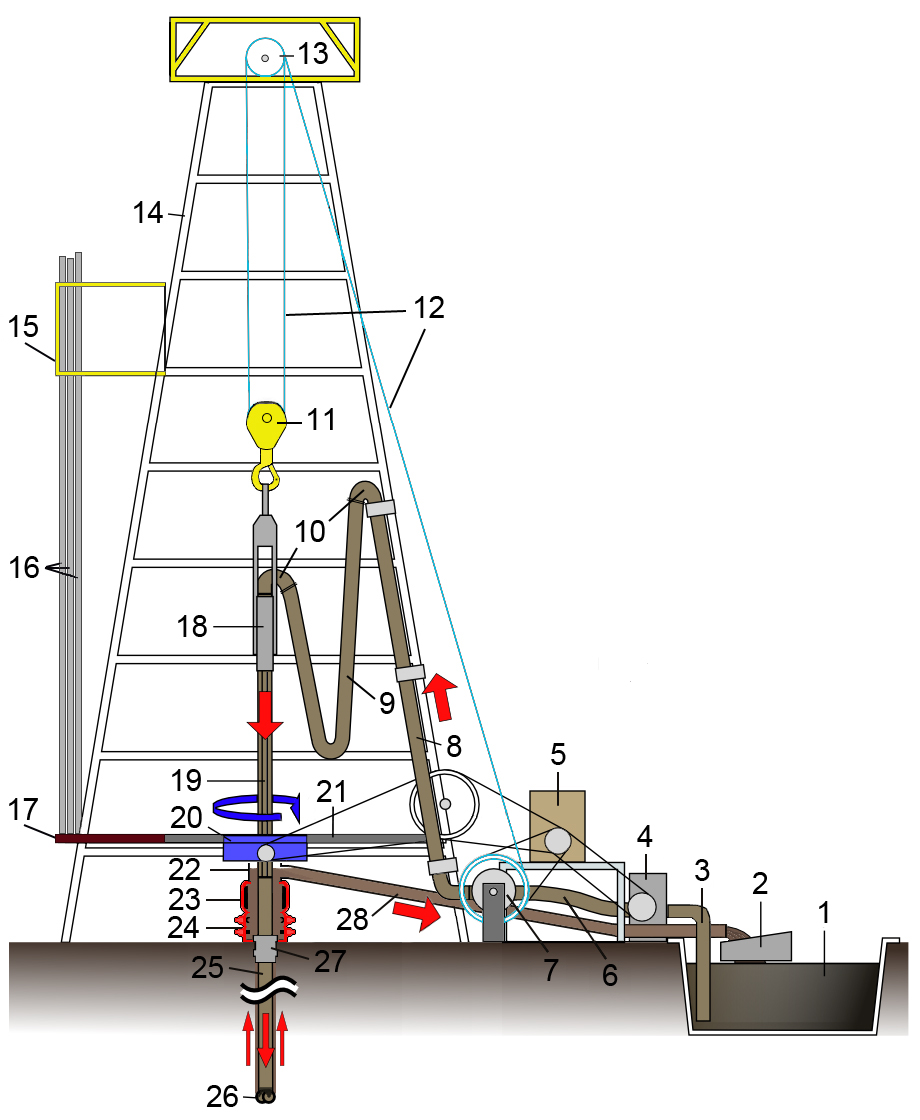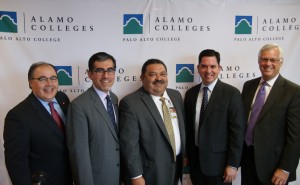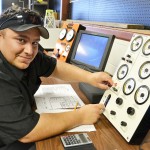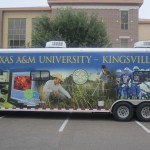Category: Eagle Ford Oil Education
Eagle Ford Operators & Delegates Gather in Houston to Discuss Mitigating Production Declines
Houston, Texas
01.29.14
It’s a packed house today at the Eagle Ford Production, Artificial Lift & Choke Management Congress 2014.
Sharing case studies fresh out of the field, the information is real time and real word as we hear from top industry experts and Eagle Ford operators like Pioneer Natural Resources, Primera Energy, Austin Exploration, Murphy Oil, Texas American Resources and Carrizo Oil & Gas talk about the criteria used to achieve optimal artificial lift to keep wells performing at peak levels, after the initial flow rates decline.
It’s all about maximizing oil recovery, flow rate efficiency, and the barrels of oil produced per day.
The conference producers are enhancing the presentations by encouraging direct questions from the delegates via microphones throughout the room. Delegates (industry experts themselves) are asking panel members to expand upon case studies being presented as well as any other questions they may have.
We’re hearing terms like Rod Pumps – Gas lift – Plunger Lift – Toe Up versus Toe Down – Frac Hits – Offset Fracs
Folks are talking about the problems they’re having with sand. Average lateral lengths on the horizontal part of the well bore in the Eagle Ford are 4,000 to 5,000 feet, with 17 to 20 frac stations at about 10,000 feet of depth.
For More information: http://www.eagle-ford-production-2014.com/
Coastal Bend College – Five-day Oil & Gas Safety Training Available at Pleasanton This Fall
Press Release
Contact: Monica Cruz, (361) 354-2258, mcruz@coastalbend.edu
For immediate release
Five-day oil & gas safety training available at CBC Pleasanton this fall
Coastal Bend College, in partnership with Petroleum Education Council (PEC) Premier, will be holding five-day Oil Patch Preparation Systems (OPPS) safety trainings this fall at the CBC Pleasanton site. The OPPS trainings are scheduled for October 14-18, November 11-15, and December 9-13.
Coastal Bend College Host of the Eagle Ford Shale Service, Transmission, Exploration and Production Safety (STEPS)
Press Release
Contact: Monica Cruz, (361) 354-2258, mcruz@coastalbend.edu
For immediate release
CBC Pleasanton to serve as STEPS Network host
PLEASANTON, TX—Coastal Bend College has volunteered to be the host of the Eagle Ford Shale Service, Transmission, Exploration and Production Safety (STEPS) Network Chapter for the Pleasanton area. The STEPS Network is an all-volunteer based organization that promotes safety, health and environmental improvement in the exploration and production of oil and gas across the country.
Alamo Colleges Launches New Oil and Gas Degree Program
San Antonio, TX
NEWS RELEASE Sept. 10, 2013
Palo Alto College now offers oil and gas degree
Alamo Colleges-Palo Alto College will begin offering an associate degree program in Oil and Gas Technology beginning in the Fall 2013 semester after receiving approval by the Texas Higher Education Coordinating Board in June 2013.
“We will provide highly trained employees for the oil and gas industries in support of the Eagle Ford Shale region in South Texas,” said PAC president Dr. Mike Flores. “Because of our location in south San Antonio, Palo Alto College is poised to become the training hub for oil and gas corporations for the Eagle Ford Shale.”
Students in the Associate of Applied Science (AAS) in Oil and Gas Technology program will receive training as petroleum pump systems operators, service unit operators, roustabouts and other similar process and production technician positions. Process technicians will be trained to operate petroleum refining and processing units and are expected to earn an average of $23.76 per hour. Production technicians could earn an average of $21.36 per hour and will be able to maintain equipment in the petroleum and natural gas industry.
Eagle Ford Drilling Rig Components

By derivative work: Mudgineer (talk) Oil_Rig_NT.PNG: Tosaka (Oil_Rig_NT.PNG) [CC-BY-3.0 (http://creativecommons.org/licenses/by/3.0)], via Wikimedia Commons
Drilling Rig Components Legend
- 1. Mud tank
- 2. Shale shakers
- 3. Suction line (mud pump)
- 4. Mud pump
- 5. Motor or power source
- 6. Vibrating hose
- 7. Draw-works (winch)
- 8. Standpipe
- 9. Kelly hose
- 10. Goose-neck
- 11. Traveling block
- 12. Drill line
- 13. Crown block
- 14. Derrick
- 15. Monkey board
- 16. Stand (of drill pipe)
- 17. Pipe rack (floor)
- 18. Swivel (On newer rigs this may be replaced by a top drive)
- 19. Kelly drive
- 20. Rotary table
- 21. Drill floor
- 22. Bell nipple
- 23. Blowout preventer (BOP) Annular
- 24. Blowout preventers (BOPs) pipe ram & shear ram
- 25. Drill string
- 26. Drill bit
- 27. Casing head
- 28. Flow line
Coastal Bend College Adds Well Operation Simulator to Oil and Gas Technology Program
Press Release
For immediate release
CBC Oil and Gas Technology Program purchases UltraLight Simulator
BEEVILLE, TX—Coastal Bend College recently purchased an UltraLight Simulator for students in the Oil and Gas Technology Program to utilize in their courses beginning summer 2013. The purchase was possible through the Perkins Grant Program which helps fund improvements to workforce programs and equipment at CBC.
- Bob Forbeck-Owens, a CBC student, took on the role of being a choke operator on the new UltraLight Simulator purchased by CBC’s Oil and Gas Technology Program. Forbeck-Owens is one of the first students to operate the state-of-the-art simulator.
- CBC student Omid Ebrahimi is all smiles after successfully completing his first simulation as a well driller on the new UltraLight Simulator. Ebrahimi had to troubleshoot a pressure issue in the well using the knowledge he’s gained during his summer oil and gas courses.
Crude Oil Assay
A crude oil assay is essentially the chemical evaluation of crude oil feedstocks by petroleum testing laboratories. Each crude oil type has uniquemolecular, chemical characteristics. No crude oil type is identical and there are crucial differences in crude oil quality. The results of crude oil assay testing provide extensive detailed hydrocarbon analysis data for refiners, oil traders and producers. Assay data help refineries determine if a crude oil feedstock is compatible for a particular petroleum refinery or if the crude oil could cause yield, quality, production, environmental and other problems.
The assay can be an inspection assay or comprehensive assay. Testing can include crude oil characterization of whole crude oils and the various boiling range fractions produced from physical or simulated distillation by various procedures. Information obtained from the petroleum assay is used for detailed refinery engineering and client marketing purposes. Feedstock assay data are an important tool in the refining process.
- Statoils page for links to crude oil assays
- Chevron page for links to crude oil assays
- BP page for links to crude oil assays
- Total page for links to crude oil assays
- ExxonMobil page for links to crude oil assays
- Santos page for links to crude oil assays
- Canadian page for links to crude oil assays
- Shell Capline for links to crude oil assays
- Environment Canada link to crude oil properties database
- Malaysian page for links to crude oil assays
- Kernel Energy crude oil assays
Find a Well in Eagle Ford
Get a birds eye view of that drilling rig in your backyard…
Great search tool to find a well in Eagle Ford (or anywhere in the country). Get a satellite close up Google Map view of the oil or gas well.
Eagle Ford Prompts Texas A&M Kingsville to Reinstate Natural Gas Engineering Program
The demand for natural gas engineers within Eagle Ford has prompted Texas A&M Kingsville to reinstate it’s Natural Gas Engineering undergraduate program. The program is designed to help get the Eagle Ford gas to the US markets, thus reducing our dependence on foreign gas.
Since TAMU Kingsville currently has a masters program in natural gas engineering, this reinstatement will use existing laboratories and staff. The program has been approved by the Texas Higher Education Coordinating Board and will be offered to students this Fall semester.
For more information see: http://www.engineer.tamuk.edu/departments/ngen/index.html
- Texas A&M Kingsville
- TAMU Kingsville Eagle Ford






